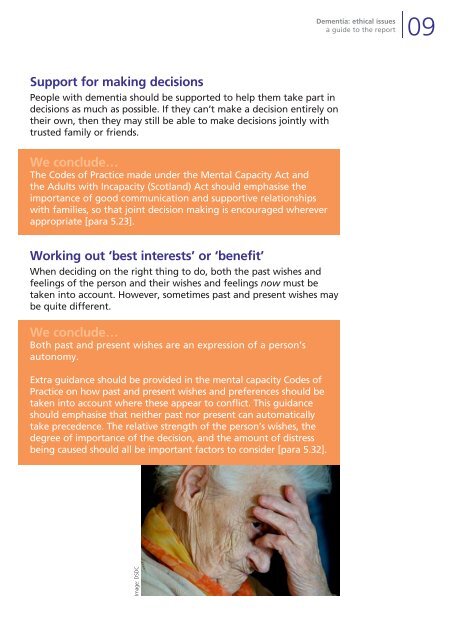Dementia: ethical issues - Nuffield Council on Bioethics
Dementia: ethical issues - Nuffield Council on Bioethics
Dementia: ethical issues - Nuffield Council on Bioethics
Create successful ePaper yourself
Turn your PDF publications into a flip-book with our unique Google optimized e-Paper software.
<str<strong>on</strong>g>Dementia</str<strong>on</strong>g>: <str<strong>on</strong>g>ethical</str<strong>on</strong>g> <str<strong>on</strong>g>issues</str<strong>on</strong>g><br />
a guide to the report<br />
09<br />
Support for making decisi<strong>on</strong>s<br />
People with dementia should be supported to help them take part in<br />
decisi<strong>on</strong>s as much as possible. If they can’t make a decisi<strong>on</strong> entirely <strong>on</strong><br />
their own, then they may still be able to make decisi<strong>on</strong>s jointly with<br />
trusted family or friends.<br />
We c<strong>on</strong>clude…<br />
The Codes of Practice made under the Mental Capacity Act and<br />
the Adults with Incapacity (Scotland) Act should emphasise the<br />
importance of good communicati<strong>on</strong> and supportive relati<strong>on</strong>ships<br />
with families, so that joint decisi<strong>on</strong> making is encouraged wherever<br />
appropriate [para 5.23].<br />
Working out ‘best interests’ or ‘benefit’<br />
When deciding <strong>on</strong> the right thing to do, both the past wishes and<br />
feelings of the pers<strong>on</strong> and their wishes and feelings now must be<br />
taken into account. However, sometimes past and present wishes may<br />
be quite different.<br />
We c<strong>on</strong>clude…<br />
Both past and present wishes are an expressi<strong>on</strong> of a pers<strong>on</strong>’s<br />
aut<strong>on</strong>omy.<br />
Extra guidance should be provided in the mental capacity Codes of<br />
Practice <strong>on</strong> how past and present wishes and preferences should be<br />
taken into account where these appear to c<strong>on</strong>flict. This guidance<br />
should emphasise that neither past nor present can automatically<br />
take precedence. The relative strength of the pers<strong>on</strong>’s wishes, the<br />
degree of importance of the decisi<strong>on</strong>, and the amount of distress<br />
being caused should all be important factors to c<strong>on</strong>sider [para 5.32].<br />
Image: DSDC

















